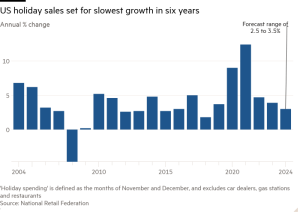UK Treasury breached legal duty by failing to reveal overspending, says OBR
Unlock the Editor’s Digest for free
Roula Khalaf, Editor of the FT, selects her favourite stories in this weekly newsletter.
The Treasury breached its legal obligations by failing to disclose a potential £9.5bn overspend by UK government departments in the run-up to the March Budget, the head of the fiscal watchdog said on Tuesday.
Richard Hughes, chair of the Office for Budget Responsibility, said it previously had a “high trust relationship” with the finance ministry, where it could be confident that the 40 per cent of public spending allocated to Whitehall departments was being well managed.
But “that system very clearly broke down”, he told the House of Commons Treasury select committee on Tuesday of preparations for the previous Conservative government’s final fiscal event.
“There were about £9.5bn worth of net pressure on departments’ budgets which they did not disclose to us as part of our usual Budget preparation . . . which under the law and under the act [of parliament] they should have done,” he added.

As a result the relationship would now have to evolve from “a system of trust to a system of trust but verify”, Hughes said.
The OBR last week said its forecasts for public spending before the March Budget would have been “materially different” had it known the full extent of pressures on Whitehall departments at the time, even though some pressures had emerged only later owing to subsequent policy decisions.
The legal framework under which the OBR prepares its forecasts is based on a 2011 act of parliament and the separate Charter for Budget Responsibility.
It specifies that forecasts must “be based on all government decisions and all other circumstances that may have a material impact on the fiscal outlook”. An accompanying memorandum of understanding says government departments must “alert the OBR in a timely manner . . . if a forecast judgment or policy costing appears to be off-track”.
In July, the watchdog initiated a review when Labour chancellor Rachel Reeves said she had inherited a previously undisclosed £22bn “black hole” in the public finances from her Tory predecessor Jeremy Hunt.
Reeves said the shortfall drove her decision to raise taxes by more than £40bn in the Budget last week, despite assuring voters before the election that she had no plans to be “a big tax-raising chancellor”.
But Hughes warned that there were risks to delivery of her plans. Only about half of the extra taxes Reeves planned to raise could be relied on, he said, with the rest of the new revenues dependent on “raising taxes on relatively small numbers of individuals” where “it is not clear how they will respond”.
The big increase in government spending was heavily front-loaded, potentially making it difficult to spend the money effectively without driving up the cost of the projects, Hughes added.
Most new spending would be to meet day-to-day pressures on public services, he noted, with capital expenditure constant as a share of GDP, even after the latest boost.
However, Hughes downplayed concerns over the risks of a sell-off in UK government debt as a result of the Budget announcements. The large increase in borrowing and the front-loading of new spending was bound to come as a surprise to the market, he said, and the rise so far in gilt yields had been roughly in line with OBR forecasts.
As Hughes gave evidence to the committee, the spread between UK and German short-dated bonds increased to its widest for almost 14 months, in a market unsettled by the wait for the result of the US presidential election.
The spread between UK and German two-year yields had increased by about 4 basis points on the day to 217.3 basis points by early afternoon, while the spread between five-year gilts and Bunds increased to 210.2 basis points — in both cases, the most since September 2023.
The Treasury did not immediately respond to a request for comment. Hunt declined to comment.
#Treasury #breached #legal #duty #failing #reveal #overspending #OBR



